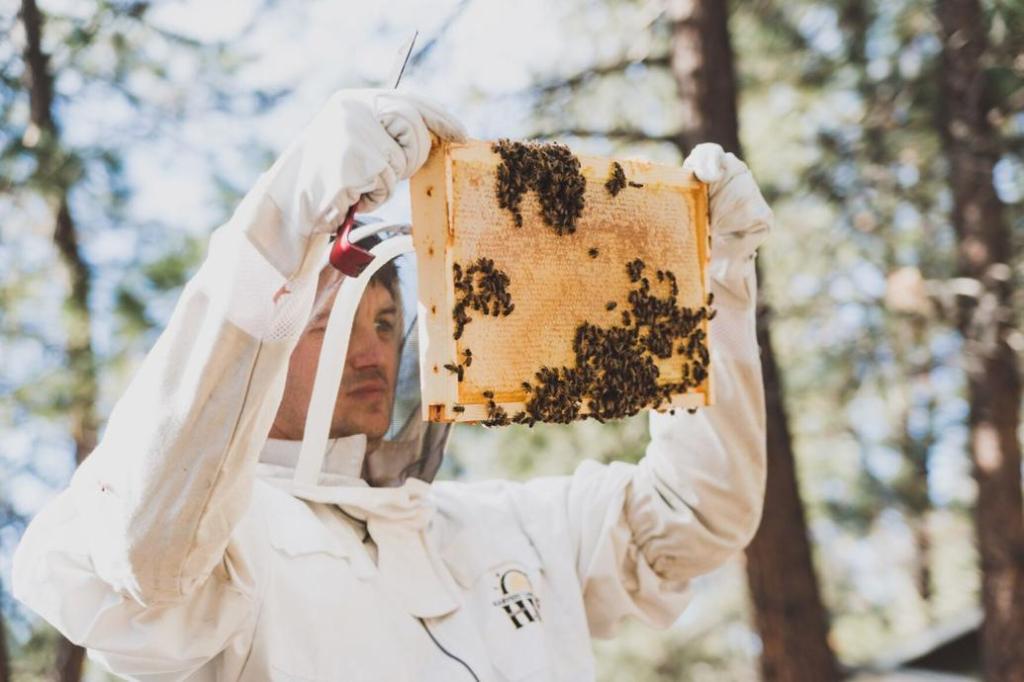Sponsored Content
Together for Community Learning
Published 12:27 pm Thursday, January 9, 2025
Sporting an amber-colored T-shirt that reads “Bee the Change,” master beekeeper Jimmy Wilkie stands in front of an evening Community Education class on COCC’s Bend campus and dispenses honeybee wisdom.
At some point in their short lives, Wilkie shares, all worker bees will be assigned the sole task of seeking out and transporting water to cool the hive down in summer — generally traveling up to a mile and a half before beelining back and expelling the liquid; busy wings create the cooling effect. If a hive needs to move their large queen, he adds, she’ll be fed less and slimmed down for the coming flight.
As to when honey can be harvested in Central Oregon, it’s once a year, close to Labor Day when rabbitbrush is in bright yellow bloom and bees can quickly turn to that source of nectar for replenishing their winter stores. And yes, stings happen, Wilkie acknowledges, but being a good hive overseer can greatly reduce those odds.
“Managed bees are less aggressive,” he tells the 11 students, several of whom have journeyed from Prineville and Madras for the two-part class. “Some people say bees can recognize your face.”
“Beekeeping for Beginners,” now in its third year — offered this spring with dates TBD — is a toolkit-type class to get a backyard honey operation up and running. It also connects Central Oregonians to their natural world and helps activate food generation. Bees and their pollination, after all, are responsible for one out of every three bites of food we ingest.
And as an active member of the Redmond-based Central Oregon Beekeeping Association, Wilkie brings a larger-purpose layer to his teaching, something that goes beyond hive essentials. His class is drawing attention to the mission of the community-oriented nonprofit and its part in addressing a disturbing, continuing trend of large-scale bee die-offs: From April 2022 to April 2023, for instance, U.S. beekeepers reported losing over 48% of their colonies due to adverse weather, pesticides and other factors.
Collaborating on these kinds of hands-on learning experiences is a priority for COCC’s Community Education department. By working with groups and individuals who bridge into important initiatives, the program’s catalog can help amplify important work happening in the region.
“It’s our goal to partner with great organizations that are already providing public education in our communities,” explains Stephanie Goetsch, director of Community Education. “And we can support their missions and help get the word out about the good work they do.”
Some collaborations are offered completely free, including health-focused partnerships with Stroke Awareness Oregon (a free class will be offered on Jan. 21) and the Oregon Chapter of the Alzheimer’s Association (free classes on Jan. 22 and Feb. 19). A free Chinese language camp called “My Summer in China” for youth and college students — being offered this July in cooperation with a National Security Agency’s STARTALK grant — has an application deadline of March 6.
A partnership with the Upper Deschutes Watershed Council, first formed in 2023, continues to bring a weeks long speaker series titled “Learn About Your Home Waters” to Central Oregon, with the 2025 series starting Feb. 4.
Focused on the Metolius River and the Upper Deschutes watersheds, the in-depth series features six sessions apiece, including a river’s-edge tour. A similar series on Whychus Creek was held in Sisters last spring.
The five-session Metolius River Watershed Speaker Series, beginning Feb. 4 with an every-other-Tuesday format, will be held 5:30-7:30 p.m. at the Sisters High School, and concludes with an all-day field tour.The five-session Upper Deschutes Watershed Speaker Series, beginning April 10 with an every-other-Thursday format, will be held 5:30-7:30 p.m. in Sunriver (location TBD), and concludes with an all-day field tour.
“These presentations, led by local experts and natural resource managers, provide a broad opportunity to learn about a variety of topics within the Metolius and Upper Deschutes watersheds,” explains Kris Knight, executive director of Upper Deschutes Watershed Council, whose nonprofit works to protect and restore the 2-million-acre watershed. “It’s a great learning experience for citizens of Central Oregon to learn about our water resources and associated topics, whether they are new to the area or have lived here for many years.”
Attendees learn from a diverse roster of scientists about things like habitat restoration, river hydrology, water quality and native fish populations. The classes are staged with the support of COCC’s enrollment and promotion services.
For the full COCC Community Education catalog, visit cocc.edu/ce.









